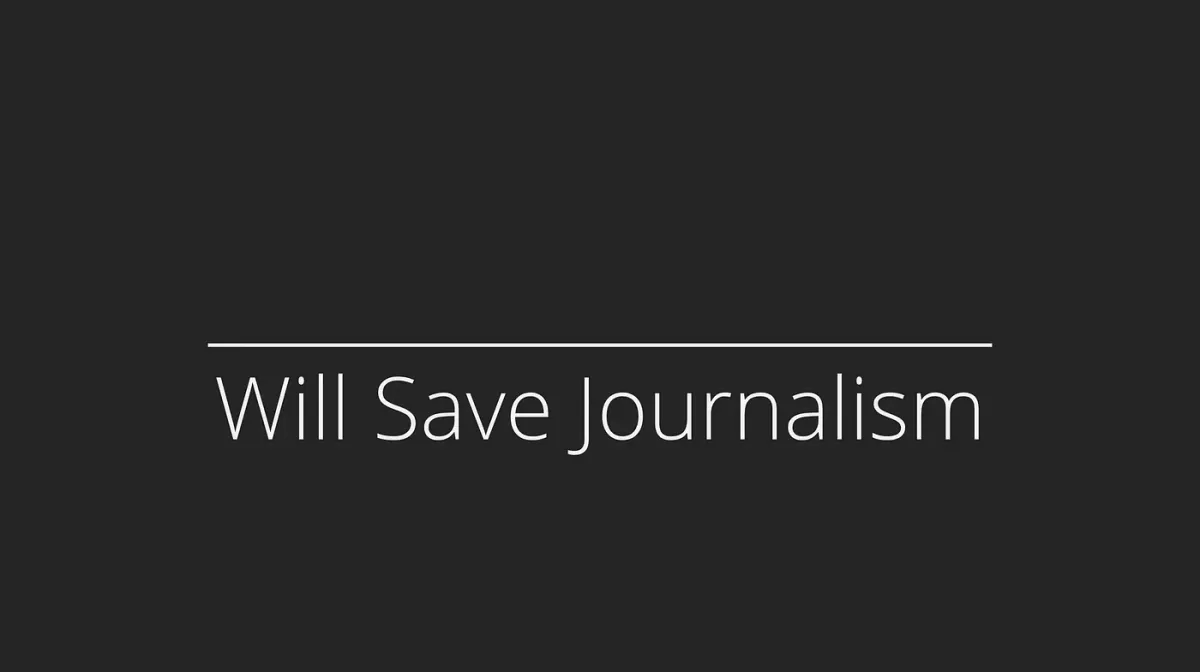The Misogyny Mirror: Journalism and Culture

Watching the societal conversations on gender roles and tensions reflected in the decline of journalism
*Yes, I know journalism is under attack. But it is always under attack and that's not a reason to stop pushing for it to be better.
Much has already been written about the deeply ingrained history of misogyny in the field of journalism. We could recount the way news organizations struggled in the face of GamerGate or the Washington Post’s handling of Felicia Sonmez’s employment. There are years of research showing gender disparities in staffing and beats. Women in journalism still experience pay gaps, with figures even worse “for women of colour, LGBTQ+ individuals, and those from marginalised communities, who face multiple layers of discrimination,” according to the International Federation of Journalists. Research from Reuters last year found that “only 24% of the 174 top editors across the 240 brands covered are women, despite the fact that, on average, 40% of journalists in the 12 markets are women.” In 2020, the World Economic Forum wrote that a 2015 study suggests just 24% of news sources (people seen, heard or read about in the media) were women. That representation was a ten-year increase from 17% in 1995. They wrote “At this rate, it will take at least three-quarters of a century to reach numerical gender parity.”
But even with out all of those pieces of data, it’s easy to see not just a passive form of misogyny imbued in the field but a grasping, indignant refusal to evolve from organizations and personalities where misogynistic and patriarchal tactics and their accompanying entitlements are fused to the very bone.
We’re watching what feels like the dramatic uptick of objection that precedes a significant change. Not a dying gasp necessarily, but a fraught one at the very least. The conversations about the struggles of journalism are getting louder and more misdirected in some spaces. The exhortations about gender roles and masculinity are numerous and widely disbursed. It’s become impossible to not see the overlap between the two.
Journalism’s defenders have to make far better arguments for the field than “if we weren’t here, bad things would happen”... while bad things are happening.

She won’t speak to us
Let’s step back to the election. No, not the one in 2016. 2024.
Vice President Kamala Harris officially announced she was running on July 21 and within weeks was being taken to task for not giving interviews to legacy media outlets. The critique quickly took on the tone of dismissiveness of her as a serious candidate. She wasn’t exactly hidden, with rallies and public events at a steady pace through the summer and fall. She just wasn’t speaking to the largest news organizations when they wanted. It’s also worth noting that when she did take questions, more often than not they were about her reaction to something Trump had done or said rather than about her positions and perspectives. She was constantly put in the position of answering for his words and actions.
The air of commentary from journalists quickly began to take on an indignant tone. As if she wasn’t a legitimate candidate until one of the major media outlets declared it so. There was a sense of disbelief that a candidate for national office might find the larger news outlets irrelevant in reaching the people her campaign wanted to reach.
But that particular theme of a woman, especially a black woman, not being considered legitimate at what she does or who she is unless she acts as expected in order to be deemed so by those who perceive themselves as the arbiters of such things, well that’s not a new thing at all is it?
But, think of the journalists
Fast forward to the end of October and word comes out that the Washington Post will not be publishing a presidential candidate endorsement for the first time in decades. Not because it wasn’t originally planned—no—it's reported that Post owner Jeff Bezos intervened in existing plans to publish a presidential endorsement. Bezos published a note in the opinion section on October 28 that the paper would not be publishing a presidential endorsement. In his note, Bezos bemoaned the lack of trust in journalism and the poor timing over everything. It's a flavor of weaponized incompetence that is amusing given that his fortune was made on a company infamous for delivering on intense logistics within tight timelines, but sure, let’s pretend the discovery of mistrust in news was a recent event and that the election date that was known years ago, and candidates known months in advance was difficult to plan around.

I’ve written a little about the endorsement debacle itself. What’s relevant for this essay is the fallout from the dropped endorsement. People began cancelling their subscriptions. By the tens of thousands. As those numbers started to become apparent, there was a chorus of people within the field extolling the importance of not cancelling subscriptions to the Washington Post in light of the news. The reason? Think of the journalists.
Cancelling subscriptions, holding the Post accountable in the only way subscribers could, would negatively impact the journalists who work there.
When you give people only one lever for accountability and then tell them they can’t use it, you are telling them they cannot have any boundaries for themselves for what actions they will be party to, let alone financially support.
“Don’t cancel your subscriptions, think of the journalists.” Wild how that sounds so much like “Don't divorce him, think of the children.”
Don’t maintain your boundaries. Prioritize someone else’s well-being over your right to decide what you support with your time, energy and money. Think of the harm you could cause if you held accountable the party that transgressed.
"These are people who want what these spaces claimed to provide and had finally had enough."
Among all the reprimands, I was grateful to see Sydette Harry stepping in to actually ask people why they unsubscribed. One quick form asking for 100 responses and in three hours, she found out that people who cancelled had not only carefully considered the impact on journalists but found themselves at their last boundary for continuing to support the paper. It wasn’t just one thing that prompted a knee-jerk reaction, nor was it, as described by more than one male news commenter, a desire to "punish" Jeff Bezos. People were just done. Harry observed "This wasn't punitive. It was protective of themselves and a way to signal how committed they were...These are people who want what these spaces claimed to provide and had finally had enough. And in a bit of grace I am honestly not sure they deserve ... FIFTY percent of people who unsubscribed would come back."
People didn’t unsubscribe just because of one abandoned endorsement and women don’t leave their marriages over dirty dishes.
People saw signs of what was to come and they acted accordingly.
If you think we’re bad now, we could be worse
That brings me to this past week where I ran into the most recent example that pushed me over the edge and into pulling this essay from the back of my mind where I’d been stewing over these bits and pieces.
By chance I spotted a post from the Society of Professional Journalists advertising their Sin & Win ethics contest for college journalists. The campaign is part of SPJ Ethics Week. As part of the contest, SPJ encouraged student journalists to make up stories — "the wilder, the better" — and publish them with annotations of how the stories broke the SPJ Code of Ethics.
This contest comes at a time when students are literally being snatched off the street for the content of their editorials. The first post on LinkedIn, which I and others shared with the encouragement that students not participate, soon attracted more than a dozen comments from professionals criticizing the contest for its approach. In the past, such contests were unwise, but not necessarily dangerous. But we are not in that time anymore. There are myriad ways this can go wrong for students. There are countless ways such material gets taken out of context and weaponized.
That post was deleted not long after and replaced with another post stating it was a “corrected version of an earlier post.” No details of the contest were changed, just the sentences introducing it. Though the SPJ Code of Ethics calls for journalists to “Explain corrections and clarifications carefully and clearly,” no details were offered as to what the new post was correcting. The replacement post then attracted 50 comments, the vast majority again critical of the contest.
Timing and goals aside, it has been the language in the contest details that has stuck in my head since I first read them.
“What are you doing? Showing readers who think journalists are lying-terrorist-pedophile losers just what the world would look like if we had no ethics at all.”
Now, there are multiple things wrong with this particular notion, chief among them being that people who think such things are not ones who can be convinced to become supporters of the press after an encounter with a faked unethical college newspaper annotated with ethics policies.
What is most jarring is the bitterness dripping from every word of that sentence. It's the same tone of voice you hear when a Nice Guy feels his Nice Guy-ness isn’t appreciated enough and he unmasks himself in rapid fashion to reveal an enraged, entitled man who wants you to know that he was choosing niceness and if you're not going to appreciate that, he’ll show you the alternative.
This isn’t how to demonstrate journalism ethics. This isn’t how to demonstrate coverage that lacks ethics. This is like attempting to teach the importance of non-violent conflict resolution by punching someone in the face while telling them “this is what I shouldn’t do if I’m resolving this conflict without violence” and then expecting them to be grateful that you don’t usually punch people.
It’s worth noting that the contest asked the most vulnerable among journalists, students, to step up to fight a battle on a front where they simply can’t win, while potentially jeopardizing their enrollment, their scholarships and even their freedom all for the chance to win $500 and make a point that doesn’t need to be made. While this project appears to be the product of the SPJ ethics committee based on responses on LinkedIn, its sentiment stands out as in stark contrast to others expressed by the organization members during its Ethics Week.
The Legacy Media Loneliness Epidemic
Much of opining about falling subscriptions and the turn away from traditional media to influencers or solo reporters has begun to bear remarkable resemblance to the online communities of men lamenting the male loneliness epidemic.
It is a branding choice as loneliness is actually pretty evenly reported across genders. What they are actually objecting to is a decline in romantic prospects, as fewer women are trying to date. As it turns out women inclined to partner with men are increasingly not sold on the appeal of a man who wants a woman to contribute 50% of the household income and 100% of the household and emotional labor. Nor are women lining up to date men who vote for political agendas that would strip away their rights and protections. Women have experienced a steep drop in confidence that dating or a relationship with a man is worth it.
Now, the laments from Men with Microphones aren’t about how men seeking companionship might evolve to be more appealing to women. No, they say, it’s women who must adjust their expectations and conform. That this is how things are supposed to be and women need to learn to settle.
Vaguely sourced research is bandied about indicating nearly half of women will be single and childless within a couple decades. It’s couched in cautionary terms that women are the ones who must be careful or they’re going to end up alone. Though, research shows that it’s men that benefit from marriage more than women. And even though the event of divorce impacts women more negatively, women still initiate the majority of divorces. Read that again, even though it will likely leave them worse off in multiple ways, they would still rather leave than continue to be stuck in a dynamic that isn’t working for them.
The arguments presented by many men are that if women didn’t have them, then who would take out the garbage, or fix the roof, or take care of the car. Things that don’t have to be done every day and can, in fact be handled by alternative means. Meanwhile, those same men are leaving behind messes and complications that make daily life all the more difficult. Worse still, the argument of who would protect a woman if they aren’t with a man? Statistically speaking, a woman is more likely to be harmed by her partner than a stranger. A significant percentage of men seem to not understand the actual contributions women want from them in a relationship.
Single women are buying houses at higher rates than single men, getting advanced degrees at higher rates than single men and traveling more than single men. The number of women-owned businesses is growing faster than those owned by men.
What was once consider the basic assumptions are outdated and many men are struggling to adapt.
Nobody wants real news anymore
Yeah, many people turning away from sources of news. However, people do still want news and will seek it out. But they aren't turning to institutions that have repeatedly demonstrated, that while they can do useful and important reporting, they will also pursue destructive coverage that platforms dishonesty under the guise of presenting both sides and material that normalizes what should be condemned.
The field is in denial. The common refrain is that we need journalism so the worst things that can happen to a democracy don’t happen. But it happened. It. Fucking. Happened. That’s the world we’re living in right now.
So is the argument that it happened because there wasn’t enough journalism? Or there wasn’t enough of the right kinds of journalism? Or there wasn’t enough of the right kinds of journalism in the right places? Or there wasn’t enough of the right kinds of journalism in the right places accessible to the right people? What is the problem? And what are we going to do to fix it besides asking people to subscribe and donate regardless of what we’re actually doing right now?
The big argument legacy media defenders have been making the past decade and beyond is that we’ll need them when something bad happens. Yet their very practices of access journalism, both-sides-ism and normalization of extreme positions are undeniably part of why the bad things are happening. The journalists people were arguing to protect from cancelled subscriptions were already working at the Washington Post when Trump won the election so the argument effectively being made to the public was to protect the status quo that didn’t work. I’m not blaming the journalists at the Washington Post, most of whom have absolutely no control over what the company as a whole does nor is it their fault the election turned out the way it did. But we have to stop pretending that the change can only come with the continued unwavering support from the audience.
No, the field of journalism isn't entirely to blame. But it is not blameless either. If we're being honest with ourselves, we know that the way many legacy media organizations are operating and who they are platforming have contributed to getting us here.
What we were doing before was demonstrably not working so why would anyone support journalism until there is accountability for that and a clear and obvious change?
Many of those organizations are making the mistake of thinking that someone stepping away from them will be left uninformed, but the reality is that there is an entire secondary succession event happening with a new growth of alternative sources of news and information that don't look like and don't operate in the way of what has come before.
We are in an era of leaving the things that do not work and will not change. We're not trying to change them and we're not waiting for them to change any more.
Journalism isn’t only a form, it’s a function. It doesn’t only come in neat packages of newspaper, cable and broadcast or online news. It doesn't require an organization that has existed for decades or even years. It’s a societal function that can be performed by anyone with a little training and support. It's true end goal isn't the production of news, it's the production of understanding and the opportunity to participate in shaping our society.
Meaningful relationships do not only come in the form of a romantic relationship. It’s a function of care that can be performed by anyone with empathy and kindness.
The popularity of searches into the 4B movement and much of the commentary on social media indicates that many women have come the conclusion they are more happy single than giving up their peace for a man who can’t figure out how to be a safe, functioning adult partner who respects his partner and carries his half of the relationship. Many women are finding they are fine taking care of themselves. There are alternatives for what a man might have uniquely provided in years past, without the burden of being continually disappointed at receiving the most meager of value in all other aspects of the relationship.
When it comes to legacy media, news consumers are coming to the same conclusion. The questions is which organizations are going to evolve and which ones are going to be left.







